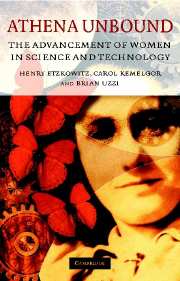Book contents
- Frontmatter
- Contents
- Acknowledgements
- Introduction: Women in science: Why so few?
- 1 The science career pipeline
- 2 Women and science: Athena Bound
- 3 Gender, sex and science
- 4 Selective access
- 5 Critical transitions in the graduate and post-graduate career path
- 6 Women's (and men's) graduate experience in science
- 7 The paradox of critical mass for women in science
- 8 The ‘kula ring’ of scientific success
- 9 Women's faculty experience
- 10 Dual male and female worlds of science
- 11 Differences between women in science
- 12 Social capital and faculty network relationships
- 13 Negative and positive departmental cultures
- 14 Initiatives for departmental change
- 15 International comparisons
- 16 Athena Unbound: Policy for women in science
- Appendix
- Bibliography
- Index
12 - Social capital and faculty network relationships
Published online by Cambridge University Press: 08 September 2009
- Frontmatter
- Contents
- Acknowledgements
- Introduction: Women in science: Why so few?
- 1 The science career pipeline
- 2 Women and science: Athena Bound
- 3 Gender, sex and science
- 4 Selective access
- 5 Critical transitions in the graduate and post-graduate career path
- 6 Women's (and men's) graduate experience in science
- 7 The paradox of critical mass for women in science
- 8 The ‘kula ring’ of scientific success
- 9 Women's faculty experience
- 10 Dual male and female worlds of science
- 11 Differences between women in science
- 12 Social capital and faculty network relationships
- 13 Negative and positive departmental cultures
- 14 Initiatives for departmental change
- 15 International comparisons
- 16 Athena Unbound: Policy for women in science
- Appendix
- Bibliography
- Index
Summary
If a man can write a better book,
preach a better sermon,
or make a better mousetrap than his neighbor,
though he builds his house in the woods
the world will make a beaten path to his door.
Ralph Waldo Emerson (1855)In Chapter 6, we argued that differences in the network of contacts that a person has for exchanging resources and learning – their social capital – explain why and how women students are socially isolated and limited in their opportunities to form relationships, produce science, and gain support for their careers. In Chapter 8, we extended the argument to explain the experiences of newly minted women scientists who experience many of the same biases they did as graduate students, compounding the negative effects of their graduate school relationships and laying the groundwork for a perpetuation of the status quo. In the complex and political world of science, exclusion not only decreases a person's ability to acquire the knowledge needed to build a better mousetrap, but also decreases the ability of others to learn about and adopt it.
In this chapter, we use original survey data on the social networks of men and women faculty members to further explicate our argument and show that exclusion and access measurably affect not only perceptions of difference, but also career performance.
- Type
- Chapter
- Information
- Athena UnboundThe Advancement of Women in Science and Technology, pp. 157 - 178Publisher: Cambridge University PressPrint publication year: 2000



